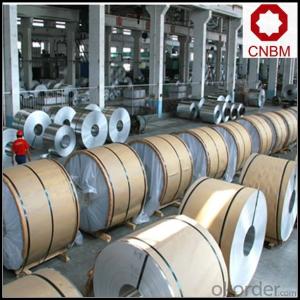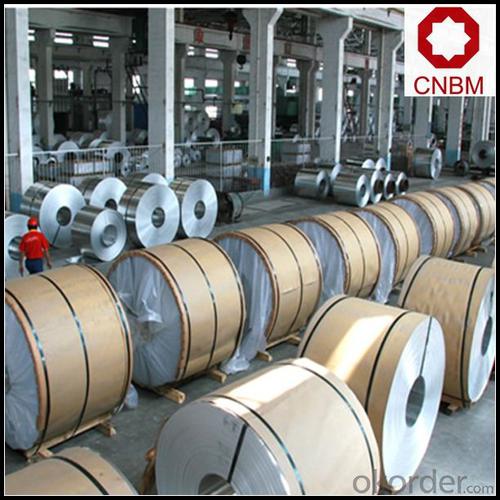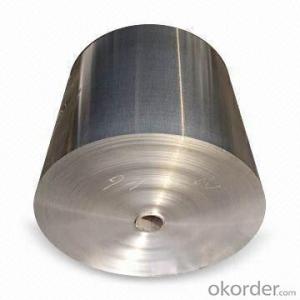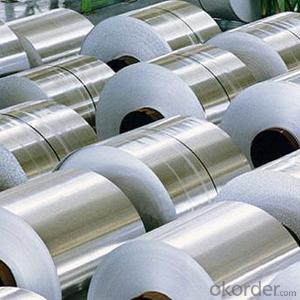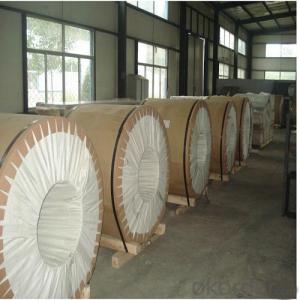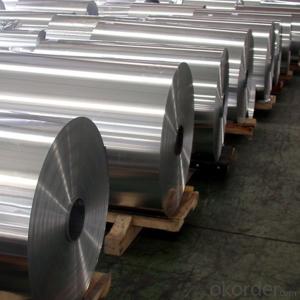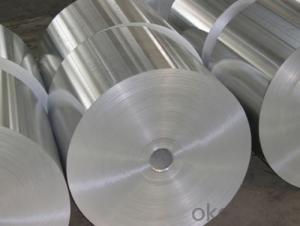Gpc143041 Hot Rolled Aluminum Coils for Oil Tanker
- Loading Port:
- Shanghai
- Payment Terms:
- TT OR LC
- Min Order Qty:
- 5 m.t.
- Supply Capability:
- 10000 m.t./month
OKorder Service Pledge
OKorder Financial Service
You Might Also Like
Specification
1. Specification of Hot Rolled Aluminum Coils for Oil Tanker
Alloy: 1050, 1060, 1100, 3003, 3004, 3005, 3105, 5005, 5052, 5083, 5754
2) Temper: Various status
3) Thickness: 0.3-150mm
4) Width: 300-1950mm
5) Length: Under9500mm/ Coil
6) Weight: 2.5-5.0 tons per coil
7) Dimensions and weight can be produced according to clients' specifications.
8) Inner Diameter: 505mm, 605mm
9) Packing: Export standard, wooden pallet.
10) Delivery time: 20 days
11) Minimum order quantity: 5 tons per size.
12) The term of payment: T/T, irrevocable L/C at sight.
13) Surface: Bright
14)Origin: China
2. Application of Hot Rolled Aluminum Coils for Oil Tanker
(1).Interior: wall cladding, ceilings, bathrooms, kitchens and balconies, shutters, doors...
(2).Exterior: wall cladding, facades, roofing, canopies, tunnels,column covers , renovations...
(3).Advertisement: display platforms, signboards, fascia, shop fronts...
3. Feature of Hot Rolled Aluminum Coils for Oil Tanker
*Such coil is specially designed to replace aluminum ingot, due to the high export tax of aluminum ingot, the coil has better price than ingot.
*This type of coil can fit customer's remelting furnace just like ingot, no need to make any change to the production line that was previously used for ingot. The standard coil size and weight is very suitable for the feed gate of furnace.
*This type of coil causes less material wastage than ingot when remelted.
*Our coil is made directly from ore, no need to go though the ingot making process, quality is much better than other suppliers who use ingot scrap to make coil.
Be free from Oil Stain, Dent, Inclusion, Scratches, Stain, Oxide Dicoloration, Breaks, Corrosion, Roll Marks, Dirt Streaks and other defect which will interfere with use
4. Certificate:
SGS and ROHS(if client request, paid by client), MTC(plant provided), Certificate of Origin(FORM A, FORM E, CO), Bureau Veritas and SGS (if client request, paid by client), CIQS certificate
5. Image of Hot Rolled Aluminum Coils for Oil Tanker
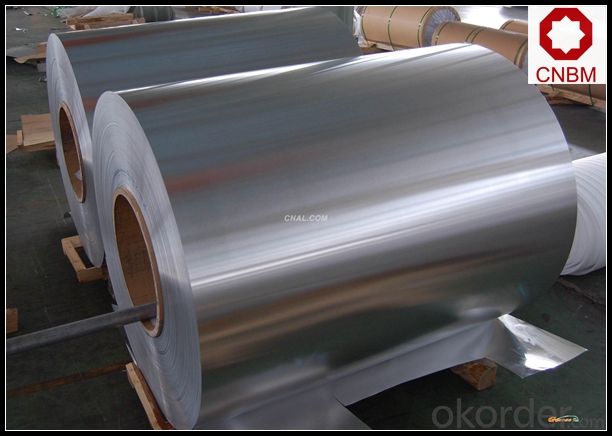
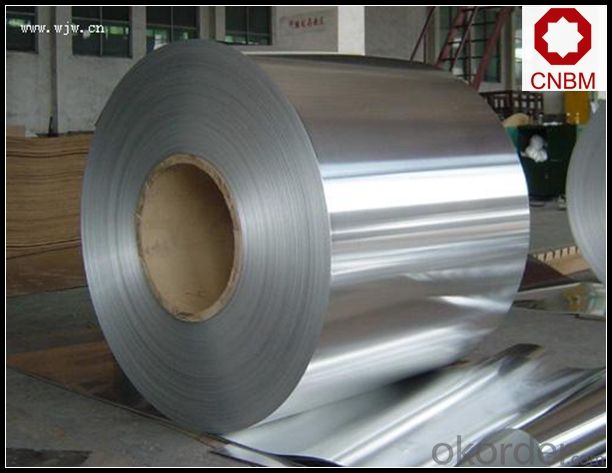
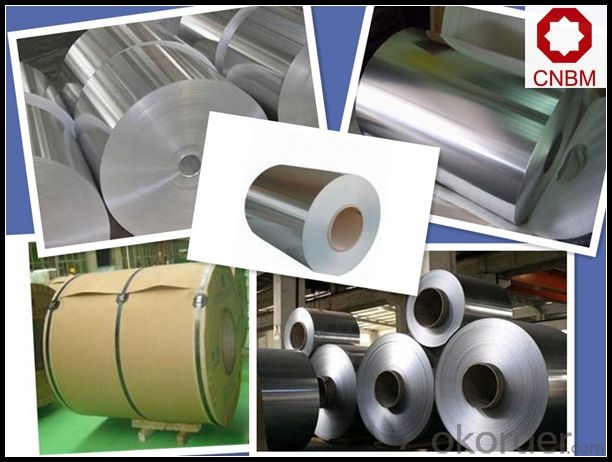
6. Package and shipping of Hot Rolled Aluminum Coils for Oil Tanker
eye to wall
eye to the wall
with wood pallet (wooded case also available)
7. FAQ
1) What is the delivery time?
Dpends on actual order, around 20 to 35 days
2)What is the QC system:
We have QC staff of 20 persons and advanced equipment, each production is with MTC traced from Aluminum ingot lot.
3) What market do you mainly sell to?
Australia, America, Asia, Middle East, Western Europe, Africa etc
- Q: Why does aluminum foil burn in the microwave but not in the oven?
- Aluminum foil doesn't actually burn in the microwave. What you are seeing is called the electro-magnetic effect. Microwaves travel as particles called photons, and when those photons hit your aluminum, they collide with the aluminum atoms and create extra electrons. Now, in larger pieces of metal, like a fork or a thermos, these electrons are distributed throughout the bulk of the object, but on thin pieces of conductive metals, like aluminum foil or gold plating, these electrons quickly build up a significant electric charge. What happens next is the same thing that happens when you drag your sock feet across the carpet in the winter and shock someone with the static charge. Sparks begin jumping from one part of the foil to another, or from the foil to the microwave itself. These sparks can cause a fire and ruin your microwave oven, to say nothing of your poor baked potato. Conventional ovens do not use microwaves, but rather just heat up the foil. Aluminum won't catch fire no matter how hot you get it, although it will eventually melt. But it is unlikely that your conventional oven will ever become that hot.
- Q: Is the aluminum coil with damaged side still useful?
- The side of tire, also called side wall, is the thinnest and most fragile. Side wall damages can be divided into swell and scratch. The swell is often caused by external force (The car is trapped in pit or on curb when you are driving fast). It can cause the cord thread break so that the rubber of the tire side wall cannot be fixed and tightened. The size of the swell is often as big as that of an one-yuan coin and will become bigger as the traveling distance increases. Under such circumstance, it is recommended to replace the tire. Scratch is usually caused by bad roads or debris on the road. It is recommended to replace the tire if the scratch in the side wall is obvious and the cord thread break. If the front wheels have such damages, the tire should be replaced as soon as possible (Because the steering, braking and driving is mainly based on the front wheels.). If there is no spare tire on site, change the front damaged tire with the rear tire and drive to an appropriate place.
- Q: a) Although Aluminium is a reactive metal, it is used to make door frames and window frames.b) Although Aluminium conducts heat, it is used to make blankets, which are good thermal insulators.
- a) true b) false
- Q: Are aluminum coils easy to install?
- Yes, aluminum coils are generally easy to install. They are lightweight and flexible, which makes them easier to handle and maneuver during installation. They can be easily cut and shaped to fit the specific requirements of the installation, and they are often available in pre-cut sizes, further simplifying the installation process. Additionally, aluminum coils are typically designed with features such as interlocking edges or snap-on connectors, which make it easier to join multiple coils together or connect them to other components. Overall, with the right tools and basic knowledge of HVAC installation, aluminum coils can be installed relatively easily.
- Q: Can aluminum coils, which are typically used for industrial purposes, be utilized for baking pizza?
- <p>Aluminum coils, commonly used in industrial applications, are not recommended for baking pizza. While aluminum is a good conductor of heat and can be used in baking, aluminum coils are often too thick and not designed for direct contact with food. They may also contain coatings or treatments unsuitable for food. Instead, use aluminum foil or a pizza stone designed for baking to ensure food safety and even heat distribution.</p>
- Q: What is the primary function or use of a spring steel wire coil?
- <p>A spring steel wire coil is primarily used for its high elasticity and strength. It is designed to return to its original shape after being deformed, which makes it ideal for applications requiring resilience and durability. Common uses include the manufacturing of various types of springs, such as compression springs, torsion springs, and extension springs, found in automotive suspensions, mechanical devices, and industrial equipment. The coil's properties also make it suitable for applications in furniture, electronics, and other industries where a reliable and consistent force is needed.</p>
- Q: What are the cost implications of using aluminum coils?
- The cost implications of utilizing aluminum coils can differ based on a variety of factors. To begin with, the expense of aluminum coils can be higher in comparison to other coil types, like copper coils. This is mainly because of the increased cost of raw materials and the energy-intensive manufacturing process involved in producing aluminum coils. Consequently, the initial purchase cost of aluminum coils may be higher when compared to other alternatives. Nevertheless, it is essential to consider the long-term cost implications. Aluminum coils are renowned for their durability and resistance to corrosion, which can result in an extended service life in contrast to other materials. This, in turn, can lead to reduced costs for maintenance and replacement over time. Additionally, aluminum is lightweight, making it easier to handle and transport, potentially resulting in reduced labor and transportation costs. Another aspect to consider is the energy efficiency of aluminum coils. Aluminum possesses excellent heat transfer properties, allowing for efficient heat exchange in various applications, such as HVAC systems or refrigeration units. This can translate to lower energy consumption and subsequently lower operating costs in the long run. Furthermore, aluminum is a highly recyclable material, which can contribute to cost savings and environmental benefits. Recycled aluminum can be utilized in the production of new coils, reducing the need for virgin materials and lowering overall costs. It is important to note that these cost implications may vary depending on the specific application and usage requirements. Factors such as the size of the system, installation complexity, and maintenance practices can also impact the overall cost-effectiveness of employing aluminum coils. In summary, while aluminum coils may have a higher initial purchase cost, their durability, resistance to corrosion, energy efficiency, and recyclability can result in long-term cost savings and environmental benefits.
- Q: What are the insulation options available for aluminum coils?
- Depending on the specific requirements and applications, there are various insulation options available for aluminum coils. Some commonly used insulation options include: 1. Foam Insulation: Aluminum coils are often insulated with foam, which provides excellent thermal insulation properties. Foam insulation comes in different forms, such as rigid foam boards or flexible foam sheets, and can be easily cut and fitted around the coils. 2. Fiberglass Insulation: Another popular choice for aluminum coil insulation is fiberglass. It consists of thin glass fibers woven together to create a blanket-like material. Fiberglass insulation is lightweight, easy to install, and offers good thermal and acoustic insulation. 3. Mineral Wool Insulation: Mineral wool insulation is made from natural or synthetic minerals that are melted and spun into fine fibers. It is known for its excellent fire-resistance properties and provides effective thermal insulation for aluminum coils. 4. Reflective Insulation: To reflect radiant heat away from the aluminum coils, reflective insulation is used. It typically consists of a layer of aluminum foil laminated to a layer of fiberglass or plastic bubble wrap. Reflective insulation is particularly effective in warmer climates where reducing heat gain is a priority. 5. Vapor Barrier Insulation: Vapor barrier insulation is applied to prevent moisture transfer through the insulation material. It is often used as a coating or film over the insulation, creating a barrier against water vapor and reducing the risk of condensation buildup on the aluminum coils. When selecting the appropriate insulation option for aluminum coils, it is important to consider factors such as thermal conductivity, fire resistance, moisture resistance, and installation requirements. Consulting with a professional or referring to manufacturer guidelines can help determine the most suitable insulation option for specific coil applications.
- Q: Can aluminum coils be used in the production of electrical transformers?
- Yes, aluminum coils can be used in the production of electrical transformers. Aluminum coils offer several advantages such as being lighter in weight, having better thermal conductivity, and being more cost-effective compared to traditional copper coils.
- Q: Are aluminum coils suitable for architectural sunshades?
- Yes, aluminum coils are suitable for architectural sunshades. Aluminum is a lightweight and durable material that can withstand various weather conditions. It is also corrosion-resistant, making it ideal for outdoor applications. Additionally, aluminum coils can be easily formed and shaped to create customized designs for sunshades, providing both functionality and aesthetic appeal.
Send your message to us
Gpc143041 Hot Rolled Aluminum Coils for Oil Tanker
- Loading Port:
- Shanghai
- Payment Terms:
- TT OR LC
- Min Order Qty:
- 5 m.t.
- Supply Capability:
- 10000 m.t./month
OKorder Service Pledge
OKorder Financial Service
Similar products
Hot products
Hot Searches
Related keywords
